|
|
|
Sort Order |
|
|
|
Items / Page
|
|
|
|
|
|
|
| Srl | Item |
| 1 |
ID:
100748
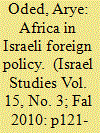

|
|
|
|
|
| Publication |
2010.
|
| Summary/Abstract |
In the 1960s, when most African states south of the Sahara achieved independence, Israel was one of the first countries to establish diplomatic relations with them and to offer them assistance. Israel was a major "donor" in Africa, and Israeli ambassadors operated in 33 countries. Africa had an important place in Israel's foreign policy. However, in 1973, during and after the Yom Kippur War, in an unexpected and severely disappointing move, almost all African countries severed their diplomatic relations with Israel. Ten years later, Israel returned, gradually, to Africa. The article examines the factors that influenced these changes and to what extent Israel drew the necessary conclusions after returning to Africa. Special emphasis is given to the making of Israel-African policy in the 1960s, which still remains the basis of Israel's present activities on the continent, although with significant changes.
|
|
|
|
|
|
|
|
|
|
|
|
|
|
|
|
| 2 |
ID:
154612
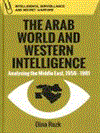

|
|
|
|
|
| Publication |
Edinburgh, Edinburgh University Press, 2017.
|
| Description |
vi, 361p.hbk
|
| Series |
Intelligence, Surveillance and Secret Warfare
|
| Standard Number |
9780748698912
|
|
|
|
|
|
|
|
|
|
|
|
Copies: C:1/I:0,R:0,Q:0
Circulation
| Accession# | Call# | Current Location | Status | Policy | Location |
| 059148 | 327.121749270973/REZ 059148 | Main | On Shelf | General | |
|
|
|
|
| 3 |
ID:
130235
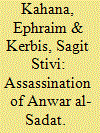

|
|
|
|
|
| Publication |
2014.
|
| Summary/Abstract |
Within the context of intelligence, the assassination of Egypt's President Muhammad Anwar al-Sadat on 6 October 1981 can be characterized as both a symbolic security failure and a failure to implement professional security principles by those responsible for guarding his life.
The circumstances creating the security "hole" were not confined to the short period preceding the assassination, but rather began long before, as part of an intense clash between two conflicting forces: extreme Islam and modern statehood.
In contrast to prevailing opinion, the apex of the struggle between these two forces is the main reason for the assassination, and not Sadat's peace with Israel. 1 The assassins of the al-Jihad group, springing unchecked from the substratum of fundamentalist Islam, carried out their work resolutely, exploiting the circumstances with almost incredible ease.
The sixth of October, observed in Egypt as a day of military triumph over the Israel Defense Forces (IDF) in the October 1973 War (the Yom Kippur War), is celebrated as an official holiday at the Grave of the Unknown Soldier on the outskirts of Cairo. On that date in 1981, on the reviewing stand stood President Sadat and his entourage: Vice President Hosni Mubarak; Defense Minister Mohammad Abu-Gazala; members of parliament; and members of the diplomatic corps, among them Israeli Ambassador Moshe Sassón.
Mirage fighter planes flew in celebratory formation above, and all in attendance were occupied with watching them and the huge parade passing before the reviewing stand, as columns of soldiers marched past the proud president.
When it was the artillery unit's turn to pass, a military truck stopped suddenly, from which four uniformed men sprang. Thinking this was part of the pageantry, no security personnel acted to prevent them from approaching the reviewing stand. One of the men quickly threw a grenade that did not explode, followed by more grenades. The assassins cocked their weapons and charged, firing at those on the reviewing stand.
The speed and suddenness with which the assassination was carried out resulted in pandemonium. People ran in all directions to take cover while Sadat stood, stiff and in shock, making him a clear target for sniper Hussein Abbas, 2 who shot him in the neck and chest. Sadat collapsed on the spot, yet this did not prevent another assassin, Abed al-Hamid, from emptying the rest of his rifle's magazine unhindered to confirm the kill. Sadat was flown by Gazelle helicopter to the Armed Forces Military Hospital at Ma'adi, but he arrived with no pulse, as his chest and arteries had been fatally penetrated.
The individual responsible for the assassination was Captain Khalid al-Islambouli. The fact that he and his partners managed to carry out this "inside job," despite explicit warnings having been received of threats on the president's life at the parade, testifies to a complete absence of common sense on the part of the Egyptian security sector.
The head of the Israeli security unit and lead investigator of the assassination, who was also responsible for Ambassador Sasson's rescue, was Avraham Rotem. According to Rotem, some members of Sadat's security detail were known to Rotem's unit personally due to previous reciprocal visits between Israeli and Egyptian personnel. 3 For this reason, the part played by Egyptian security personnel that day remains a mystery, due precisely to Israel's familiarity with them and the fact that they had acquired their security expertise from the best American instructional training. Sadat's assassination therefore raises a number of burning questions emanating from the fact that many in the upper Egyptian echelons knew that Sadat was in the opposition's crosshairs.
|
|
|
|
|
|
|
|
|
|
|
|
|
|
|
|
| 4 |
ID:
156076
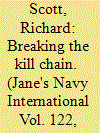

|
|
|
| 5 |
ID:
139209
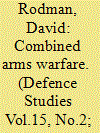

|
|
|
|
|
| Summary/Abstract |
Traditional combined arms warfare is premised on the assumption that a symmetrical mix of different kinds of units and weapons offers an army the best prospect of achieving optimal results on the battlefield. The Israel Defense Forces (IDF) has been accused by critics over the years of essentially abandoning the practice of traditional combined arms warfare before the 1973 Yom Kippur War in favor of a nontraditional (asymmetrical) variant that relied much too heavily on tanks and aircraft. While this criticism certainly has substantial merit, the IDF’s reverses in the early days of the war were not due solely to a lack of emphasis on traditional combined arms warfare, but rather also to a “perfect storm” of circumstances that obtained at the outset of hostilities. To its credit, the IDF learned rapidly from its prewar mistakes in force structure and war-fighting doctrine, reverting within days to a traditional approach to the practice of combined arms warfare, at least on the ground. Though not a battlefield panacea by any means, traditional combined arms warfare clearly contributed to the IDF’s eventual victory in the war.
|
|
|
|
|
|
|
|
|
|
|
|
|
|
|
|
| 6 |
ID:
090710


|
|
|
|
|
| Publication |
2009.
|
| Summary/Abstract |
Uri Bar-Joseph and Jack S. Levy look at the different ways in which the conscious distortion of information and the politicization of intelligence can lead to intelligence failure. They apply their categories to the Soviet failure to anticipate the German attack in 1941 and to the Israeli failure to anticipate the Arab attack in 1973.
|
|
|
|
|
|
|
|
|
|
|
|
|
|
|
|
| 7 |
ID:
159441
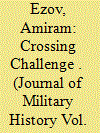

|
|
|
|
|
| Summary/Abstract |
The crossing of the Suez Canal by the Israel Defense Forces (IDF) during the Yom Kippur War of October 1973 encompassed the toughest and bloodiest battles that the IDF had ever known. Because of the characteristics of the forces and missions involved, it was the ultimate expression of a multi-dimensional battle. During the campaign, there were battles to achieve breakthrough and approach clearing, armor versus armor battles, water obstacle crossings, bridging, establishment of a bridgehead, all featuring complicated logistics. Most of the branches of the IDF became involved and a full range of combat apparatus was deployed, including some items which had not been fully developed and on which training had not been suitably completed. The central problem of the crossing campaign was the “orchestration” of new fighting materials—the means to achieve a water crossing—into a battle that had not been foreseen. Alongside organization, fighting doctrine, and training, this kind of orchestration also demanded innovative leadership and command and control, effective communications, and the ability to cope with a complex and unexpected battlefield. The aim of this article is to test and compare the objectives, planning, and execution of two crossing campaigns—that of the Egyptian Army and that of the IDF. The differences in doctrine stemmed from the choice of strategic objectives and from the adoption of differing combat doctrines.
|
|
|
|
|
|
|
|
|
|
|
|
|
|
|
|
| 8 |
ID:
145238


|
|
|
|
|
| Summary/Abstract |
The United States displayed a keen interest in the nature, progress and results of the Yom Kippur War, because the fighting was thought to reflect how non-nuclear hostilities between the North Atlantic Treaty Organization (NATO) and the Warsaw Pact (WP) would unfold on the plains of central Europe in case war broke out there. In contrast to many observers of the war, who concluded that the losses suffered by the Israel Defence Forces (IDF) at the hands of Egyptian and Syrian anti-aircraft and anti-tank weapons had rendered the aircraft and the tank largely impotent, thereby revolutionizing how wars would be waged in the future, Central Intelligence Agency (CIA) analysts and United States Army Training and Doctrine (TRADOC) Command officers, based upon an in-depth review of the nature, progress and results of the fighting, re-affirmed the centrality of these weapons systems on the modern battlefield. Rather than focus obsessively on technological developments, they concluded that training, leadership and tactics were ultimately the decisive elements in the Yom Kippur War.
|
|
|
|
|
|
|
|
|
|
|
|
|
|
|
|
| 9 |
ID:
123951
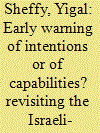

|
|
|
|
|
| Publication |
2013.
|
| Summary/Abstract |
A major school of thought in Israel asserts that: (1) a cornerstone of the Israeli security doctrine is gaining early warning based more on changes of the enemy's capabilities and less on learning its intentions; and (2) that deviation from the doctrine caused the strategic surprise experienced by the state on the outbreak of the 1973 Yom Kippur war. This assertion is examined here by looking into another case in which Israel was also militarily surprised. In February 1960 the Egyptian Army deployed offensively along the joint border, while the IDF remained unaware of the situation. Israel's conduct during the affair - known as the Rotem Affair - was based on lenient assessments (derived from sigint) regarding the Egyptian intentions, ignoring their capabilities. It transpires, therefore, that dominance of 'early warning of intentions' has been the rule rather than the exception.
|
|
|
|
|
|
|
|
|
|
|
|
|
|
|
|
| 10 |
ID:
025940
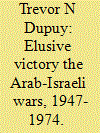

|
|
|
|
|
| Publication |
London, Macdonald & James, 1978.
|
| Description |
xxv, 669p.: mapshbk
|
| Standard Number |
0356080900
|
|
|
|
|
|
|
|
|
|
|
|
Copies: C:1/I:0,R:0,Q:0
Circulation
| Accession# | Call# | Current Location | Status | Policy | Location |
| 018381 | 956.04/DUP 018381 | Main | On Shelf | General | |
|
|
|
|
| 11 |
ID:
171047
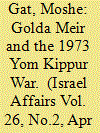

|
|
|
|
|
| Summary/Abstract |
Most historians blame Israeli Prime Minister Golda Meir for the outbreak of the 1973 Yom Kippur War, having allegedly rejected all peace proposals made by Egyptian President Anwar Sadat. In fact, Sadat was adamantly opposed to Meir’s demand for direct negotiations, envisaging political settlement as an American dictate on Israel. The Yom Kippur War shook both sides of their intransigence and brought them closer to each other’s position.
|
|
|
|
|
|
|
|
|
|
|
|
|
|
|
|
| 12 |
ID:
100732
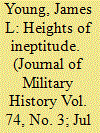

|
|
|
|
|
| Publication |
2010.
|
| Summary/Abstract |
The Battle of the Golan Heights was one of the critical events of the Yom Kippur War. Most of the current historiography follows the narrative established by Avigdor Kahalani in his work The Heights of Courage, in which the outcome was determined by the skill and courage of the Israeli tank crews of the 7th Armored and Barak brigades. While acknowledging the Israelis' bravery, this article challenges this conventional approach by stating that it was the Syrians' tactical incompetence and failure to adhere to Soviet operational doctrine that was the primary cause of the battle's outcome.
|
|
|
|
|
|
|
|
|
|
|
|
|
|
|
|
| 13 |
ID:
046091


|
|
|
|
|
| Publication |
New York, Palgrave Macmillan, 2003.
|
| Description |
xx, 320p.hbk
|
| Series |
Palgrave Essential Histories
|
| Standard Number |
0333676319
|
|
|
|
|
|
|
|
|
|
|
|
Copies: C:1/I:0,R:0,Q:0
Circulation
| Accession# | Call# | Current Location | Status | Policy | Location |
| 046766 | 956.9403/BRE 046766 | Main | On Shelf | General | |
|
|
|
|
| 14 |
ID:
174573


|
|
|
|
|
| Summary/Abstract |
This article focuses on the organisational aspects of combat as represented in Israeli films about the Lebanon Wars. It analyzes four prominent films that relate to Israel’s engagement in Lebanon from the 1982 war to its operations in the southern security strip. The analysis is augmented by comparison to prominent Israeli war films on the 1973 Yom-Kippur War. These films reflect a common and coherent Military Habitus that originates in the organisational principals that define ‘Israeli National Way of War.’ This analysis offers an alternative viewpoint to interpretations that view war cinema as manifestations of broader national narratives.
|
|
|
|
|
|
|
|
|
|
|
|
|
|
|
|
| 15 |
ID:
189415


|
|
|
|
|
| Summary/Abstract |
Unearthing a key chapter in the development of Israeli history education, this article explores history-teaching at the Hebrew Reali School in Haifa, one of Israel’s foremost schools, in the wake of the 1973 Yom Kippur War and against the backdrop of attempts made by the Ministry of Education to reform history education in Israel. It shows that in the context of the great social changes that occurred in Israeli society, Reali history teachers felt that their primary mission was to ensure that their students remained closely connected to their collective past.
|
|
|
|
|
|
|
|
|
|
|
|
|
|
|
|
| 16 |
ID:
059392
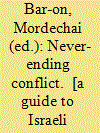

|
|
|
|
|
| Publication |
Westport, Praeger, 2004.
|
| Description |
vii, 261p.hbk
|
| Series |
Praeger Series on Jewish and Israeli Studies
|
| Standard Number |
0275981584
|
|
|
|
|
|
|
|
|
|
|
|
Copies: C:1/I:0,R:0,Q:0
Circulation
| Accession# | Call# | Current Location | Status | Policy | Location |
| 049261 | 956.9405/BAR 049261 | Main | On Shelf | General | |
|
|
|
|
| 17 |
ID:
053070
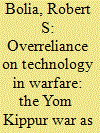

|
|
|
| 18 |
ID:
080825


|
|
|
|
|
| Publication |
2008.
|
| Summary/Abstract |
Much work has explored decision making under stress in political leadership. Less work has attempted to link the enormous emotional pressure of crisis with both the heightened sense of political accountability and responsibility and the increased need for social support under such circumstances. The authors examine the impact of political accountability, and the nature and quality of individual social support, on the relative performance of five central Israeli leaders on the second day of the Yom Kippur War. Minister of Defense Moshe Dayan and the Commander of the Southern Command, Maj. Gen. Shmuel Gonen, performed very poorly, whereas Prime Minister Golda Meir and Chief of Staff Lt. Gen. David Elazar performed very well. The Commander of the Northern Command, Maj. Gen. Yitzhak Hofi, performed adequately. The authors account for these divergences in performance based on individual differences in personal accountability and available social support networks.
|
|
|
|
|
|
|
|
|
|
|
|
|
|
|
|
| 19 |
ID:
037952


|
|
|
|
|
| Publication |
New York, Praeger Publishers, 1977.
|
| Description |
xxiv, 249p.
|
| Series |
Praeger special studies on International Politics and Government
|
| Standard Number |
0275237907
|
|
|
|
|
|
|
|
|
|
|
|
Copies: C:1/I:0,R:0,Q:0
Circulation
| Accession# | Call# | Current Location | Status | Policy | Location |
| 016734 | 320.95694/ETZ 016734 | Main | On Shelf | General | |
|
|
|
|
| 20 |
ID:
140495
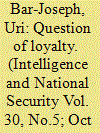

|
|
|
|
|
| Summary/Abstract |
Ashraf Marwan, President Nasser's son-in-law and President Sadat's close aide, was the most important spy in the history of the Arab-Israeli conflict. However, even today, six years after his mysterious murder in London, the question of whether Marwan genuinely worked for the Israeli Mossad or misled it is at the center of a heated debate. Following a brief description of Marwan's espionage career, this article lays out the main arguments advanced by the ‘double-agent’ school, before showing them to be groundless. I conclude that Marwan had genuinely spied for Israel and was, indeed, ‘the best source the Mossad had ever had’.
|
|
|
|
|
|
|
|
|
|
|
|
|
|
|
|
|
|
|
|
|